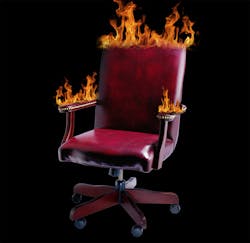The month of June was not kind to FMCSA and, in particular, its administrator Anne Ferro. Early in the month, the Owner-Operator Independent Drivers Assn. (OOIDA) sent a letter to the Dept. of Transportation asking for Ferro’s removal. In the petition, OOIDA argued that truckers “can no longer be assured of respect from and fair treatment by the administrator and the agency she leads.”
In the June 5 letter to Secretary of Transportation Anthony Foxx, OOIDA president Jim Johnston said that the board of directors of OOIDA “has concluded that the FMCSA can no longer perform its regulatory and enforcement duties impartially, and we have thus lost confidence in Administrator Ferro’s ability to conduct her responsibilities (which go far beyond simply regulating and enforcing truck safety rules and regulations) effectively.”
The turning point in the relationship seems to be a blog posted on “Fast Lane, the Official Blog of the U.S. Dept. of Transportation.” Johnston said that Ferro’s remarks in the posting, in which she argued against potential Congressional action to block the restart provision in the hours-of-service regulations, “spelled out clearly that FMCSA, and the administrator herself, view truckers not as committed professionals but as accidents waiting to happen, and that the only way to prevent these accidents is through more rules, more enforcement, and the continued treatment of truckers as a whole as if they are criminally negligent.”
That same day, the Senate Appropriations Committee voted by a margin of 21-9 to approve a measure blocking enforcement funding in fiscal 2015 for actions that support the ban on one restart per week and two consecutive rest periods of 1 a.m. to 5 a.m. The funding ban would effectively eliminate those provisions until a study could be completed on their effectiveness.
The measure is part of the larger transportation bill that must still pass the full Senate and then be reconciled with the House version.
In late March, Ferro said she was in favor of a split rest pilot test to determine the effectiveness of allowing drivers to rest when they are tired. In fact, she told a panel at the Fleet Forum, held in conjunction with the Mid-America Trucking Show, that FMCSA is planning such a study in conjunction with the National Assn. of Small Trucking Companies and OOIDA.
“Nighttime rest is best, and daytime rest is least recuperative,” Ferro said. But FMCSA is committed to continuing its review of its rules to promote safety while preserving flexibility, she added. “Split sleep could be a better option for drivers operating overnights than what we have today.”
In an exclusive interview with Fleet Owner, Ferro addressed industry criticism over HOS changes and seemed to place some of the blame on the industry for not understanding the impacts.
“Our regulatory evaluation and documents reflected a primary impact on about 15% of the trucking population, and that was primarily over the road, irregular route, and long haul,” she said. “That is what most of that calculation of a $500-million impact is based on,” “It appears that even those who commented on the rule did not foresee the impact that some of them are feeling now with regard to a schedule that is more scheduled service, even within a 500-mi. radius.”
Ferro’s and FMCSA’s insistence on using isolated incidents to push an agenda that is contrary to driver health and safety is too much for OOIDA to ignore, the association said.
“Her posting uses snippets of isolated accidents—tragedies, yes, but situations that need far more explanation and context to understand than a few simple lines on a website—to oppose a regulation that OOIDA members and others within trucking have clearly stated have a demonstratively negative impact on their health, their incomes, their ability to spend time with their families, and on the safety of the driving public,” Johnston wrote.
“Instead of speaking positively about the safety accomplishments of truckers, these types of outrageous comments exemplify an extreme bias against the trucking industry and truckers in general,” Johnston said.
“We can have strong disagreements over policy,” he continued. “However, the tone of this blog posting leads professional truck drivers to conclude that the administrator feels they are actively seeking to cause accidents (or at the very least lack a commitment to safety) by opposing specific changes to the hours-of-service regulations.”
Johnston also charged that Ferro’s comments were intended to influence legislative efforts inappropriately and violated the letter and intent of federal law barring such actions by an administration official.
For example, when questioned at a Congressional hearing in March about unintended consequences of proposed rulemakings, Ferro responded that she was “not hired to represent the industry,” Johnston wrote Foxx.
“While we can all agree that it is not the job of FMCSA to place industry interests above public safety, this kind of antagonism is not conducive to productive dialogue and indicates that Ms. Ferro does not welcome input from the very industry her agency regulates,” Johnston said. “This type of activism has no place in any government agency.”
